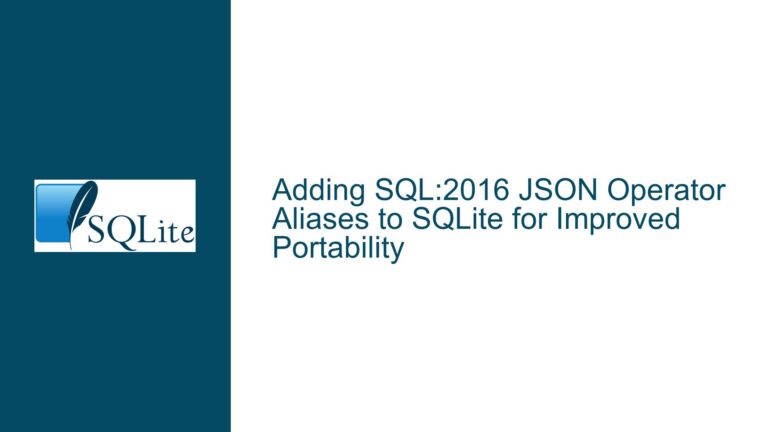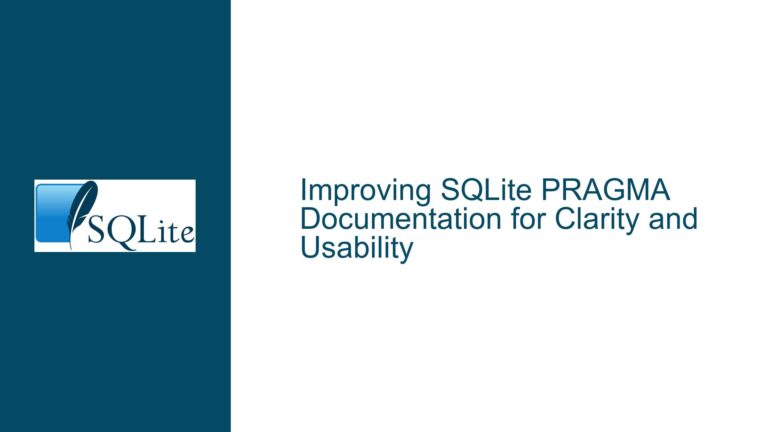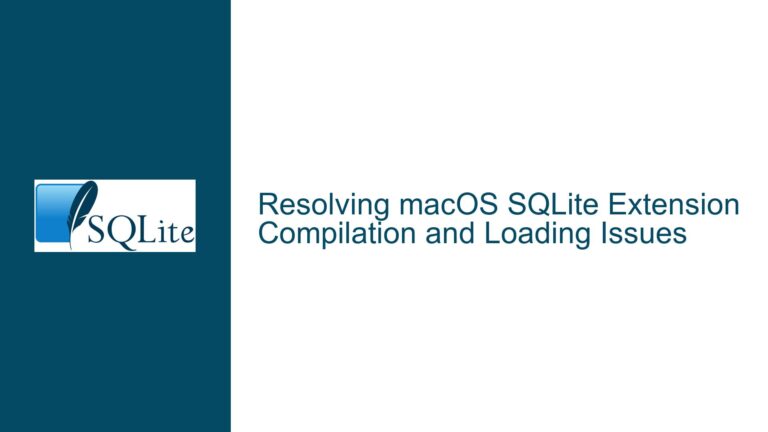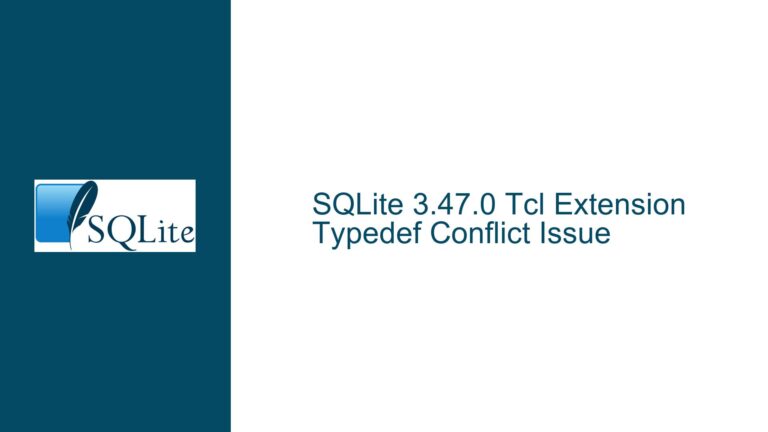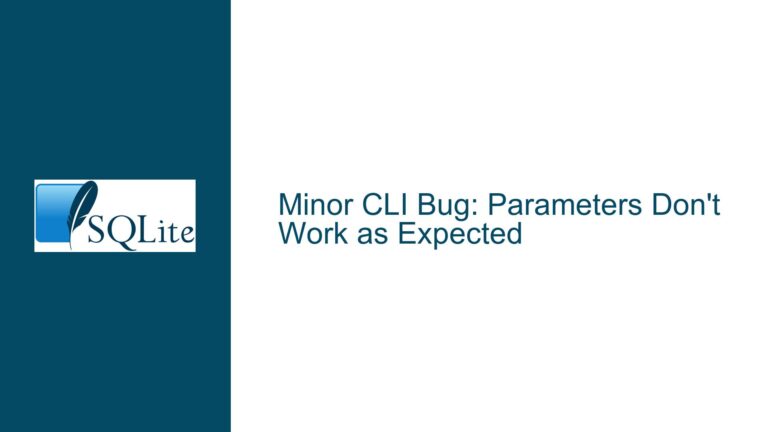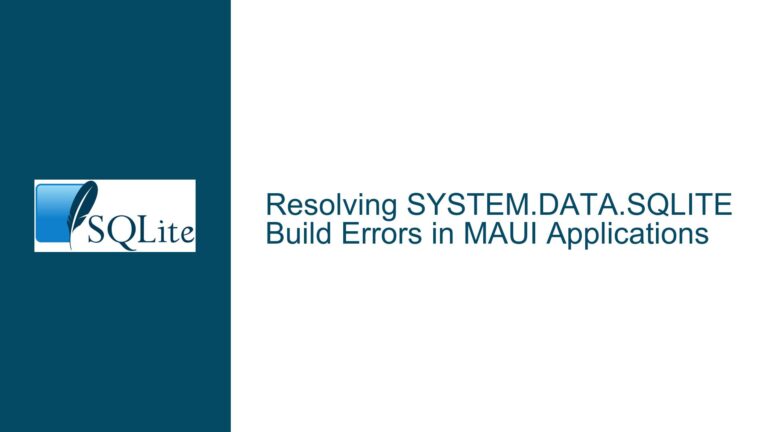Resolving Data Mismatch Errors in SQLite Multiplex3 Tests with Custom Build Flags
Understanding Multiplex3 Test Failures with SQLITE_ENABLE_8_3_NAMES and Custom Byte Order
Issue Overview: Multiplex3 Test Failures and Data Mismatch Errors
The core problem revolves around multiplex3.test failures in SQLite’s built-in test suite when compiling SQLite with custom flags, specifically -DSQLITE_ENABLE_8_3_NAMES=1 and -DSQLITE_BYTEORDER=1234. The errors manifest as unexpected data mismatch results in specific subtest cases (e.g., multiplex3-1-ioerr-persistent.514, multiplex3-1-ioerr-transient.507). These tests simulate I/O error conditions and validate SQLite’s ability to handle transient or persistent storage-layer faults while maintaining database integrity. The data mismatch indicates that the actual database state (after simulated I/O errors) does not match the expected state defined by the test script.
Key observations:
- Platform Consistency: The issue occurs across multiple platforms (Raspberry Pi 3, Ubuntu 20.04) with little-endian architecture.
- Build Configuration: The failure is tied to enabling 8.3 filenames (
SQLITE_ENABLE_8_3_NAMES=1), which modifies SQLite’s file-naming behavior for compatibility with legacy systems. - Test-Specific Behavior: The errors are isolated to the
multiplex3test family, which exercises SQLite’s multiplexor (shim layer for concurrent database file access) under error conditions. - Non-Determinism: The original developer could not reproduce the issue, suggesting environment-specific factors (e.g., filesystem behavior, Tcl library configuration) might influence test outcomes.
The multiplex3 tests rely on precise control over file handles, journaling, and error injection. When SQLITE_ENABLE_8_3_NAMES=1 is active, SQLite truncates filenames to comply with 8.3 naming conventions, which can alter file identification logic in the multiplexor. This interaction likely disrupts assumptions in the test scripts about how files are named, opened, or recovered during simulated I/O errors.
Root Causes of Data Mismatch in Multiplex3 Tests
The data mismatch errors stem from discrepancies between expected and actual database content after test operations. The following factors contribute to this:
8.3 Filename Truncation Side Effects
EnablingSQLITE_ENABLE_8_3_NAMES=1forces SQLite to generate filenames compatible with legacy filesystems (e.g., FAT32). This truncates database and journal filenames, which can interfere with the multiplexor’s file-handling logic. For example:- The multiplexor maps logical database files to physical files. Truncated names may cause incorrect file associations.
- Journal files (e.g.,
test.db-journal) might be renamed inconsistently during rollback or recovery, leading to incomplete transactions or mismatched data.
Byte Order Configuration Mismatch
WhileSQLITE_BYTEORDER=1234(little-endian) matches the target architecture, SQLite typically auto-detects byte order. Explicitly setting this flag may bypass internal checks, causing alignment issues in data serialization/deserialization during I/O error recovery.Tcl Configuration and Test Environment
The test suite relies on Tcl for scripting. Improperly configured Tcl headers or libraries (--with-tclpath errors) can destabilize test execution. For example:- Missing
tclConfig.shcauses build misconfigurations, leading to incomplete test instrumentation. - Version mismatches between Tcl and SQLite’s test harness may introduce race conditions or faulty error injection.
- Missing
In-Memory Journaling Edge Cases
Tests prefixed withinmemory_journal(visible in verbose logs) use in-memory journals instead of disk-based ones. Enabling 8.3 names may inadvertently force disk journals due to filename conflicts, violating test assumptions.Error Injection Timing Sensitivity
Theioerr-persistentandioerr-transientsubtests simulate failures at specific file operations. Custom builds may alter the timing or ordering of these operations, causing error injection points to miss critical code paths.
Resolving Data Mismatch Errors: Build, Test, and Patch Strategies
Step 1: Validate Build Configuration and Dependencies
Verify Tcl Integration
Ensure the--with-tclflag points to a valid Tcl 8.6 installation. Confirm thattclConfig.shexists in the specified directory. On Ubuntu/Debian:sudo apt-get install tcl8.6-dev ./configure --with-tcl=/usr/lib/tcl8.6 CFLAGS="-DSQLITE_ENABLE_8_3_NAMES=1"Rebuild with
make clean && maketo eliminate stale object files.Reevaluate Byte Order Settings
Remove-DSQLITE_BYTEORDER=1234unless explicitly required. SQLite auto-detects byte order correctly on most platforms. Forcing an incorrect value causes data corruption.
Step 2: Isolate and Debug Failing Tests
Run Specific Subtests with Verbose Output
Execute failing subtests individually to capture detailed logs:./testfixture test/multiplex3.test --verbose=file --case=multiplex3-1-ioerr-persistent.514Analyze logs for:
- File open/close operations with truncated 8.3 names.
- Journal file creation/deletion mismatches.
- Error injection points (e.g.,
sqlite3_io_error_hit=1).
Inspect Test Script Logic
Reviewmultiplex3.testand its subtests to identify assumptions about filenames. For example, tests may expect full filenames liketest.dbinstead of truncated versions likeTEST~1.DB.
Step 3: Apply SQLite Patches for 8.3 Filename Compatibility
The SQLite team addressed this issue in commit 1a7f3254735054ed, which modifies the test to account for 8.3 filename truncation. Apply this patch to your SQLite source tree:
- Download and Apply the Fix
wget https://sqlite.org/src/raw/1a7f3254735054ed?name=1a7f3254735054ed -O multiplex3.patch patch -p1 < multiplex3.patch - Rebuild and Retest
Recompile SQLite with the same flags and rerun the test suite:make clean ./configure --with-tcl=/usr/lib/tcl8.6 CFLAGS="-DSQLITE_ENABLE_8_3_NAMES=1" make make alltest
Step 4: Adjust Filesystem and Runtime Parameters
Use a Case-Sensitive Filesystem
Test on a case-sensitive filesystem (e.g., ext4 on Linux) to avoid conflicts between truncated 8.3 names and existing files.Disable In-Memory Journals Temporarily
Force disk journals during testing to isolate in-memory journaling issues:export SQLITE_TEST_JOURNAL=delete ./testfixture test/multiplex3.test
Step 5: Advanced Debugging with SQLite Internals
Enable Debug Logging
Rebuild SQLite with debugging enabled:CFLAGS="-DSQLITE_ENABLE_8_3_NAMES=1 -DSQLITE_DEBUG=1" ./configure --with-tcl=/usr/lib/tcl8.6 makeRun tests with
-vto log internal SQLite operations, such as file opens and error injections.Trace Multiplexor Activity
Usesqlite3_multiplex_initialize()andsqlite3_multiplex_shutdown()hooks to log multiplexor file mappings and validate correctness during test execution.
By methodically addressing build misconfigurations, applying upstream patches, and validating test assumptions, the data mismatch errors in the multiplex3 test suite can be resolved. This ensures SQLite’s reliability under custom configurations while maintaining compatibility with legacy filename requirements.

